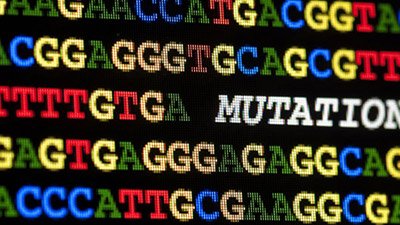Are You a Mutant?
A team of researchers has added to our knowledge of the genetic mutation rate in humans, as they report in Current Biology.
News Source
- BBC News: “We’re All Mutants Say Scientists”
In the study, scientists compared thousands of genes in two men who were distantly related, having shared an ancestor who was born in 1805. Within the nucleotides analyzed on the Y chromosome, the two men had only four genuine genetic differences between them. (Eight other differences arose in the cell lines derived from cells taken from the men and cultured for analysis.)
By extrapolating that number based on the scope of the research, the team concluded an average of one mutation out of every 30 million nucleotides per generation, said study coordinator Chris Tyler-Smith of the Wellcome Trust Sanger Institute. “New mutations are responsible for an array of genetic diseases. The ability to reliably measure rates of DNA mutation means we can begin to ask how mutation rates vary between different regions of the genome and perhaps also between different individuals,” he explained.
Joseph Nadeau of Case Western Reserve University, who was not involved in the study, noted, “New mutations are the source of inherited variation, some of which can lead to disease and dysfunction, and some of which determines the nature and pace of evolutionary change.”
This research is interesting and may prove useful, indeed, for disease researchers, given that most mutations that have any effect at all have a deleterious effect. And as far as scientists have seen, mutations that have a positive effect nonetheless result in the effect by corrupting or deleting information, not adding it—as Darwinian evolution would require. Also, in matching mutation rates with evolutionary dates, creationists should bear in mind that the mutation rate may not have been constant over the years (although evolutionists generally make this assumption).
In related news, a study of Central Asian “ethnic groups” shows that such groupings are more social constructions than biological truths. Researchers led by Evelyne Heyer of the Musée de l’Homme learned that genetic differences between members of two so-called ethnic groups were actually greater than the differences between the two groups.
Heyer explained, “Our results indicate that, for at least two of the Turkic groups in Central Asia, ethnicity is a constructed social system maintaining genetic boundaries with other groups, rather than being the outcome of common genetic ancestry.”
The team’s research is reflective of what we have long argued about all human people groups, including what are mistakenly called “races”; even though some groups share superficial and cultural differences, we are all equally human in the eyes of biology—and all of “one blood,” as the Bible teaches (Acts 17:26). Differences in such features as skin tone can be explained by such factors as natural and artificial selection working on pre-existing genetic variation, similar to what is described in a LiveScience article this week (though we would note that all humans probably diverged from an original mid-brown shade of skin, some becoming lighter and others darker).
Further Reading
- Are There Really Different Races?
- Get Answers: Genetics, Mutations, Racism
For More Information: Get Answers
Remember, if you see a news story that might merit some attention, let us know about it! (Note: if the story originates from the Associated Press, FOX News, MSNBC, the New York Times, or another major national media outlet, we will most likely have already heard about it.) And thanks to all of our readers who have submitted great news tips to us. If you didn’t catch all the latest News to Know, why not take a look to see what you’ve missed?
(Please note that links will take you directly to the source. Answers in Genesis is not responsible for content on the websites to which we refer. For more information, please see our Privacy Policy.)

Answers in Genesis is an apologetics ministry, dedicated to helping Christians defend their faith and proclaim the good news of Jesus Christ.
- Customer Service 800.778.3390
- Available Monday–Friday | 9 AM–5 PM ET
- © 2026 Answers in Genesis




